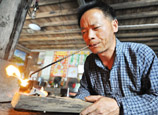
Property bubble or bust
Wuyi Road is just the epitome of Changzhou's focus on real estate development in recent years. The local authority has introduced a series of policies to encourage developers and buyers.
Changzhou's first subway line will break ground next year and will mainly travel under Wuyi Road. Property developers noted that local authorities have already invested 8 billion yuan ($1.3048 billion) to renovate the surroundings of Wuyi Road.
A manager from Czfcw.com, the city's biggest real estate agency, told the Global Times that some 100 property projects are still under construction in Changzhou now.
Changzhou's population broke 4.5 million in 2012, a nearly 20 percent increase compared with 10 years ago. However, figures show most of this growth came from migrant workers brought in to build the city and who have limited spending power.
Compared with nearby cities such as Suzhou and Nanjing in Jiangsu Province, Changzhou holds far less attraction for the middle class due to its lack of schools, institutions and enterprises.
Previous media reports questioned if the city will ever be able to attract enough popularity to consume its huge property stock in the future.
But the voice of the local government seems to be optimistic. According to Lu Jingfeng, director of real estate supervision at the Changzhou Housing Administration Bureau, the trading volume of commercial housing in Changzhou increased by 29 percent in the first half of this year.
Last year, the trading volume of commercial housing in the city reached 6.58 million square meters, or 62,093 residences, only second to Nanjing and Suzhou in Jiangsu Province.
"The housing prices in Changzhou are much lower than those in first-tier cities which is helpful for building up demand," Lu told the Global Times.
Lu also clarified that opinions about the high amounts of unused property were misguided. He said more than half of the city's 10 million square meters of real estate, built since 2009, either still belonged to developers or was intended to be used to resettle people displaced from their original homes.
"It is unscientific to compare Changzhou with a city like Ordos. Not one project stopped in Changzhou last year and prices have not fallen like they have there. I think media have exaggerated the facts," Lu added.
Lu said that the rapid property construction in Changzhou is because "it is happening everywhere in China now." But he believes the vacancy situation will change as the city becomes more mature in the next few years.


















 Factory explosion may stoke concern
Factory explosion may stoke concern


![]()
